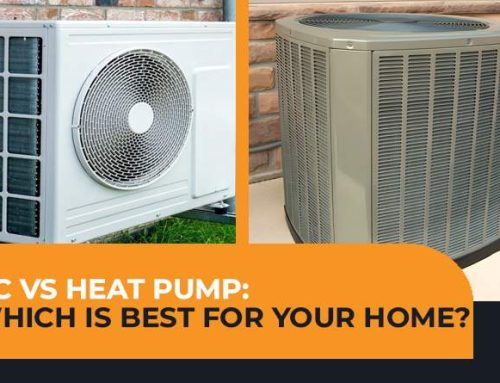Are you searching for an advanced and reliable HVAC system for your residential or commercial needs? Deciding between a heat pump and a mini split unit can be tough with so many available options.
If you are still trying to figure it out, also take a closer look here. Here, we will share the significant differences between both systems. Moreover, we will provide a thorough guide about choosing a central heat pump or a ductless mini split for your needs.
As your trusted local HVAC experts, we understand how important it is to make an informed decision. That’s why we are here to assist you in choosing better for your home and office.
Take free first-time consultations or maintenance services at The Bee Heat & AC. Contact us today and book your in-house consultation without any delay.
In this article, we have compiled the pros and cons of heat pumps vs mini split, their working efficiency, cost, and many other factors that need attention. So, let’s dig in and understand the significant differences between these two.
What Is a Heat Pump?
A heat pump is a highly efficient energy system that uses refrigerant to absorb heat from the outdoors and pump it into indoor spaces and vice versa.
Moreover, it has an all-in-one heating and cooling system, making it a perfect choice for both summers and winters.
Heat pumps are highly energy efficient, save money on energy costs, and come with dual functionality. It consists of an outdoor unit that extracts air, converting it into warm or cold air depending on the indoor temperature settings.
Additionally, they use a technology that moves the heat from one location to the other with minimal energy. They can be used in a ducted system or paired with one or more indoor air handlers across different zones to create a mini-split system.
Pros of Heat Pump:
Before making an informed decision, thoroughly research the pros and cons of the products. Here are some of the benefits:
1: Energy efficiency
A ducted heat pump is highly efficient in energy as it moves heat rather than generating it. Such a phenomenon reduces the total power consumption.
Energy reports reveal that heat pumps consume less than 50% of a furnace or baseboard heater.
2: Cost effective
Heat pumps vs mini split costs are lower, making them an ideal choice for individuals looking to switch to green energy solutions.
Unlike conventional furnaces, a heat pump doesn’t rely on fuel burning, which lowers costs.
3: Durability
Heat pumps are robust and durable. Built with commercial-grade material, their components often last 10- 25 years, depending on the region.
Furthermore, their compact and long-lasting design is ideal for homes with limited storage space.
Cons of Heat Pump:
Even though the merits of a heat pump are enormous, there are also some drawbacks. So, let’s have a look:
1: Higher operational costs
Heat pumps can be the potential reason for higher electricity bills for areas with high electricity rates.
Especially during the heating season, their operational cost can be higher than all other heating methods.
2: Potentially higher upfront costs
Heat pumps with extensive setups are much higher than traditional boilers and other HVAC systems. Its installation costs are high, making it a huge deal for homeowners.
This is not always the case, though and sometimes heat pumps can be very cost-effective to install, especially with the combination of state and utility rebates.
3: Limited temperature range
Some Heat pumps have a limited temperature range compared to other HVAC systems, such as furnaces and boilers.
This is unsuitable for certain climates where extreme temperatures are expected. They make Cold Climate Heat Pumps (CCHP) for these environments, so if you’re unsure if a heat pump will work in your climate, contact a few local contractors to confirm the best system for your home.
What is a Mini Split?
A ductless mini split system is a modern heating and cooling solution that offers highly efficient heating and cooling all year round.
A mini split works on the principle of heat transfer, similar to the heat pumps, except they do not need ductwork. Moreover, unlike a ducted heat pump, it can heat and cool multiple zones. Mini-split systems can be broken down into two categories:
1: Single zone mini split
A ductless mini-split system with one indoor and an outdoor unit is ideal for domestic and commercial use.
2: Multi-zone mini split
It features multiple indoor units connected to only one outdoor unit. The numerous zones offer temperature control in various spaces of your home.
The versatility offers the best value for money in the areas where different rooms have different climate needs.
Pros of Mini Split Systems:
Here, we share a few merits of having ductless mini-split systems, such as:
1: Lower upfront cost
A mini-split system is cheaper to install than all other HVAC types because it does not require extensive ductwork. Furthermore, a single mini-split is the best choice for small homes.
2: High efficiency
Mini-splits are highly efficient as they utilize far less energy than traditional systems. They are best for homeowners on a budget and looking for the most efficient system in order to save money on their utility bills.
3: Easy installation
Ductless mini splits need no ductwork throughout your home or business space, making them quite easy to install. Moreover, they offer a customized HVAC system according to your requirements.
4: Zone control capabilities
Multiple split units offer an amazing feature that creates different temperature settings for other spaces in a house. In addition, each zone’s temperature can be controlled independently without burdening the system’s energy efficiency.
Cons of a Mini Split System:
Just like there are benefits of an HVAC system, there are some drawbacks that one must consider before making a decision.
Here are some cons:
1: Higher upfront cost
The mini-split system has a higher initial cost, including split units and installation charges. However, a higher upfront cost, once paid, can help you save all around the year.
2: Maintenance requirements
Regular service and maintenance are crucial to keep a system running efficiently. Mini split systems also require cleaning and repairs every season.
Furthermore, it requires a professional service for the maintenance that counts as an annual expense for the users.
Choosing Between a Mini Split and a Heat Pump
Selecting the right type of HVAC system for your home and office is a significant decision. It impacts several factors in your life, such as the utility bills, your comfort, budget and preferences.
When considering a heat pump vs mini split, make sure to weigh up all the aspects involved, such as:
Climate & location:
Heat pumps offer versatility in regions with varying temperature changes, whereas the mini split systems perform well in areas with moderate climate changes.
Heating & cooling requirements:
Depending on your heating and cooling needs, choose the system that sits well while maintaining a consistent temperature within your budget.
If you have compartments in your house with different climates, go with a multiple mini-split system; otherwise, a heat pump is a good choice for comprehensive heating for your entire home.
Budget constraints:
It is essential to weigh the upfront cost, operational cost and annual maintenance fees for heat pumps and mini-split systems against the long-term energy efficiency and utility savings.
Choose the best without disturbing your financial plan for the year.
Contact The Bee Heat & AC
In the complex world of HVAC systems, making the right decision at the right time significantly impacts your home’s environment.
We at The Bee Heat & AC will help you choose which type of HVAC system suits you well according to your home’s heating and cooling preferences.
Contact us today for heat pump installation and repair services for your property.
FAQs
Are mini splits better than heat pumps?
Mini-splits are a better option for homes and properties with many compartments and different climate zones. At the same time, heat pumps are the best choice for entire home temperature maintenance with efficiency.
What are the disadvantages of a mini-split?
Some drawbacks of mini splits include the need for a head unit on the wall, high upfront costs, and space requirements. Additionally, it also adds to the aesthetic concerns of the individuals.
Is it cheaper to run a mini-split or central AC?
The initial upfront cost may seem huge for a mini split heating and cooling system, but it offers a long-term energy-efficient solution that covers utility bills.


